- Home
- L. R. Patton
The Dragons of Morad Page 2
The Dragons of Morad Read online
Page 2
The children, it seems, have vanished into thin air. There is not a trace of them, thanks to magic.
Sir Greyson and his men are tired. They have been looking for so long, day after day after day, with nothing new to report to a king who grows angrier by the hour. King Willis, as we know by now, is not a patient man, and he cannot understand why the children have not yet been found, why the king’s men lost them in the first place, though if you remember, the king’s men lost the children because of the disappearance of the king’s own son and a call that divided the soldiers in half.
Every day the children remain missing is another day the children travel farther into the arms of safety, but, to the king’s men, it is another day the guard travels farther from those arms, for the king could very well decide to rid himself of all these men who have failed him. Captain Sir Greyson knows how uncertain his future is. He knows how uncertain his mother’s future is. This is why he continues searching for the missing children, for he does not, truth be told, want to find the children at all. If not for his mother, who suffers from the sugar sickness and is only alive because of the medicine Sir Greyson receives from the castle, he would abandon this search entirely.
Perhaps, if the king could tell Sir Greyson what it is he intends to do with the children, Sir Greyson might change his mind. Or perhaps not. Sir Greyson has always loved children, though he never had any of his own. He has never seen the dungeons beneath the dungeons. He can only imagine how dark and damp and unforgivable a place such as that one can be. He has asked the boy, Calvin, who takes food and water to the children, what it is the boy finds on his descents into these dungeons. Calvin has reported that the children grow more frightened by the day, for no child wants to live forever in a place where they cannot see the very finger that scratches their nose. Sir Greyson knows that the king will not allow captured children to live in comfort until the one with magic is found. And even then, it is not a guarantee that the others will be released.
And so it is that our good captain of the king’s guard does not perform his duties as well as he might, in another circumstance, perform them. He has seen the looks of the villagers. He has seen the way Fairendale has changed since the children disappeared. He has seen the look in his king’s eye, desperate to keep a throne at all costs.
There is mourning and there is darkness and there is greed all around.
Sir Greyson knows what side he wants to be on, what side he would be on, if not for the letter. This morning it arrived from the village healer. His mother would not last much longer, it said. Not without stronger medicine. Not without a return of the light. And the light will not return without the children. He does not know this for certain, but a man can sense these kinds of things.
Tell me, dear reader, what is it you would do? Leave the children to their escape, ensuring your mother’s death, or find them, hoping that you will be able to save them yet?
So it is that Sir Greyson continues his duty. So it is that he orders his men to continue looking under every stone and tree and crack of the earth. So it is that they search for a piece, just a tiny trace of the missing children to lend all the king’s men hope and relief.
Meanwhile, the day passes on and night hastens toward them.
Sir Greyson looks around at his men. There is his second in command, Sir Merrick, a good man with a daughter who disappeared. There is his rear guard, a man who lost three children in the roundup. There is the man whose wife has not risen from her bed since the day his baby girl was taken. He can see how defeated they are. He can sense how very near they have come to giving up. He has noticed their surreptitious glances toward the village, where everything they love waits for men who may or may not return at the end of day.
“Sir,” says Sir Merrick.
Sir Greyson turns to him. “Yes, Sir Merrick?” he says. Sir Merrick points toward the sky. Sir Greyson had not noticed, before now, how dark it had become.
“We must move from these woods soon,” Sir Merrick says.
Yes. They must. He nods at Sir Merrick, who lets out a long whistle. The men turn to face Sir Greyson and Sir Merrick, their armor clanking and ringing with a noise that echoes through the woods and makes the silence within the trees seem ever more dangerous.
Sir Greyson lets out a long breath. The king would not be pleased that they had found nothing this day, but he cannot risk keeping his men in the forest after sundown. He lifts his voice loud enough to be heard by the men at the outer edges. “Hear me, men!” he says. They stand silently, looking toward their captain. They trust Sir Greyson completely, these men, for he is a good man. A good man is a good leader. “We must return to the castle. The sun will not light the way much longer.” The men involuntarily shiver, a sound that spreads through the wood like a clanging of muted bells. The men know that dusk is the most magical time of all, when eyes could play tricks on minds and one could not know whether what one was seeing was real or imagined until it was too late. The woods had been known to keep grown men, not just children. They have heard about the horrors that crawl from their daytime hiding places. They know about the imps and trolls and creatures that cannot be named, for no name even exists to describe them.
The men begin to mount their horses, sending up a great roar of armor lifting up and out and catching at the top of the boughs as if no sound is permitted to leave the cover of trees. They ready their horses for running, which they will, now, have to do in order to beat the dusk.
And in the middle of all the noise comes a small voice, almost too small to be heard, snaking into Sir Greyson’s ear.
“Here,” it says.
“What was that?” Sir Greyson says to his men. They, too, stop to listen. “Did someone speak?”
The men look around, not one of them claiming the voice Sir Greyson heard.
“Here,” the voice says again. “Footprints.”
Sir Greyson turns toward the place from where the voice seems to come. But there is nothing. No one.
And then Sir Merrick says, “There.”
He points. Sir Greyson follows his arm. Off to the side, emerging from a cloud of sorts, though it is, perhaps, only fog gathering in the light of dusk, is a small, bent old woman.
A old sorceress, perhaps. Sir Greyson has never seen one quite so old. But her face, its lines and its nose and its gleaming, hungry eyes, remind him of pictures he has seen in story books.
“Leave us, old woman,” Sir Greyson says. “We must be on our way.”
“But they are here,” the old woman says. Her eyes, the bluest eyes he has ever seen, reach into his and pull, pull, pull, until he cannot look away. Sir Greyson can feel the eyes of his men trained on him, can feel the eyes of the woman drawing him closer. She is ugly and old and bent in two, undesirable in every way but for those blue eyes that remind him so much of his queen’s.
It is not Queen Clarion. She is much too old, much too bent. It is an illusion. Sir Greyson tries to turn away, but her spell, if that is what she has stretched around him, will not permit him such an easy escape.
“The children are here,” the old woman says.
“Where?” Sir Merrick calls out. He, it seems, has not been bewitched at all. His wits are still about him. “Where are they?”
Behind him, Sir Greyson can feel his men breathing hard. They are anxious to leave these woods. They are anxious to keep their lives, truth be told, and the forest does not promise their lives at all.
Sir Greyson cannot turn, cannot order them to leave, cannot move at all. He is held by a blinding blue.
Sir Merrick climbs from his horse, places his hand on his captain’s shoulder. “Where, woman?” Sir Merrick says.
She points to the ground, her eyes leaving Sir Greyson’s for a moment. He backs away. “Here,” she says.
Sir Merrick bends over the spot where the woman has pointed. Yes. There it is. A footprint. How is it that they missed this? How is it that they could not see this flattened grass, this raised dirt, this proof that
someone has walked here? Sir Greyson looks, too, and suddenly he sees them all, so many footprints, so many marks, so many children, running all in the same direction.
The children. They have found the children.
The old woman cackles. Sir Greyson’s armor clatters as he startles, so lost was he in thought. Have they really found the children? Have they really found a way? How is it that they can leave now? He looks at his men, up at the sky, back toward the prints.
“The footprints of children and those who wish to protect them,” the old woman says, “can only be seen by the light of the moon.”
She points to the sky. Sir Greyson and all his men look up. Yes, the moon has uncovered its light. It reaches fingers down, into the woods, illuminating all the prints. The forest has grown suddenly and unexpectedly dark. A wolf howls. The trees come rustling alive, and by alive, it might surprise you that I mean they open their eyes. A fog grows behind all the king’s men, obscuring their way forward.
Sir Greyson does the only thing he can think to do. He flings his sword into the ground, the hilt pointed in the direction the footprints lead, and then swings a foot over his saddle and sits heavily down.
He and his men race from the forest to the music of an old woman cackling, a wolf howling, and unknown terrors beating in pursuit.
Fortune
CORA was not like the other girls. In fact, the other girls stayed away from the likes of her, for she was unusual with her flame-red hair and her glowing green eyes, and they all said she was a magician who was not like the other magicians but was, instead, dangerous—one to be avoided.
Well, she did have magic. And no one really knew it for sure, but she knew she was skilled enough at her magic to practice the dark arts as well, though they held danger.
She had the most powerful magic in the land of Fairendale, at least before the little girl Clarion came to live in the kingdom. Cora could shape shift, which no one could do, for there were rules to magic. If one conjured a vanishing spell or attempted shape-shifting without the natural gift, one could not know if they would ever walk in their original shape again. The first time she tried shape shifting, after a strange and foreign prophetess whispered the possibility in her ear, she had been terrified. The first time she flew she did not know if she would ever touch the ground again.
But she did.
And soon it became quite easy for her to slip in and out of her skin. One moment she wore the milky robes of the beautiful girl she was becoming and the next she wore the black feathers of a bird. She could not let people see her do it, however, for they did not trust the kind of magic that could shift shapes. So she tempered what she could do and never whispered to a soul. That meant she did not have many friends, and a girl without friends is a girl mostly without hope.
She slipped in and out of her skin every night, and she would fly about the forest and the dragon lands, memorizing sights she could not look upon by day. She considered crossing to other lands, but she knew that in some places people hunted birds like her, for they found them bad omens, and so she stayed well within the bounds of Fairendale, which had no fear of blackbirds, at least not then. She was in the sky the night she saw a mermaid for the first time. Good fortune. That is what the mermaids meant. Good fortune to those who saw them in the darkness, or those who caught their tail at the evening’s last light. She saw them every night, pointing to the sky, pointing to her, in fact. Mermaids were said to know things no humans could know, so, perhaps they had guessed her secret. No matter. Mermaids were not known for telling secrets.
Though she was a lonely child, Cora had her father, who loved her dearly. And for a while, that was enough.
One night, when Cora was only a babe, the king’s men came to her father’s cottage and told him that the king requested his services at the castle. Her father had been a cook once upon a time, though he was far too old now. He did not argue, of course, but Cora knew he had hoped his cooking would be done by now.
That was the first night the king’s men had visited her father. But there was another.
During this second visit, Cora was in bed when they came. Her father left with the men that night, for the king had requested audience with him. The parents of Fairendale, you see, did not think twice about leaving their young children alone. Children were always safe. There were always watchful eyes trained on them. They would not be taken or harmed by anyone, for the people trusted one another. What is a community without trust?
But Cora did not remain that night in her bed. She stole out, for she heard the voices. She followed her father in her feathery form, and watched the entire interview, her father in King Sebastien’s throne room, from a window. And King Sebastien had the kind of voice that could carry right through a pane of glass, so Cora did not have trouble hearing what was said.
“Your daughter has powerful magic,” the king was saying.
Her father dipped his head. “Yes,” he said.
“We would like to propose a union,” the king said.
Even in her bird heart, Cora felt the excitement. She had always wanted to rule a kingdom, you see. She had always wanted to save Fairendale from the hands of a man like King Sebastien. She knew one of his sons to be good and kind. The other, she did not know. So she hoped the union would be made with the one who would rule.
“A union?” her father said. His eyes changed. She peered through the window. They were wary. Unsure.
“To my son Willis,” the king said, and Prince Willis bowed to her father. He was not an ugly boy, though his brother was much more handsome. She could not recall if this one was the first son or the second. Had they been twins?
It did not matter so much. She would still be a princess. She could use her strong will to persuade her future husband, this future king, to rule in kindness once the evil King Sebastien was out of the way. She would prosper. She had seen the mermaids’ tail, after all.
Good fortune had finally come to pass. So she flew back home to wait for her father.
When her father returned, he was surprised to see his daughter still awake. “Cora,” he said. “You should be in bed.”
“Father,” she said. “Tell me your news of the castle.”
“How did you know I was summoned to the castle?” her father said. He looked at her with all sorts of questions in his eyes, but Cora merely shook her head. “I heard them come.”
Her father’s eyes crinkled a bit, into the smile she loved so. And then they grew serious. “The king,” he said, “wants to pledge you in marriage to his son.”
“The second or the first?” Cora said.
Her father looked confused. “Are they not twins?” he said. “I thought them to be.” He looked past Cora, as if he could no longer see his daughter.
“It matters not,” Cora said. “Only what did you say?”
Her father took her hand. “I said that I would talk to my daughter.”
Cora smiled. Her father. What a kind man he was. She kissed his cheek. “Yes, father,” she said. “Yes, I will become a princess.”
Her father leaned forward, tipping her chin up so her eyes were level with his. “He is not the handsome one,” he said. “Nor is he the particularly kind one.”
She shook her head. “I care not, Father,” she said. “You have taught me well. I can always be kind. I can teach him to be kind as well.”
Her father leaned back in his chair. “Yes, well,” he said. “I am afraid it is not so easy as that.”
She patted her father’s knee. “Please tell the king yes, Father,” Cora said. “I would make this kingdom beautiful and happy as it once was.”
Her father looked at her with all the love he held in his heart. “Yes,” he said. “Yes, I believe you might.”
And that is how Cora became engaged to Prince Willis.
Fortune, it seems, was finally on her side.
She could not have been more wrong.
Throne
BACK at the castle, King Willis has been strick
en with a generous streak. Do you see him, reader, standing on his platform, letting his son sit the throne? Do you see him step back, tilt his head and study his son? Do you see the way Prince Virgil clutches the arm rests as if he will never let go?
Can you see his smile? For it is the brightest light in the room. What the children in the dungeon and the children trying to sleep in a cave would give for a light such as this one.
King Willis, you see, knows the power that lives in his throne.
It is a strange power. A knowing power. A desired power, one that latches onto the most pliable of hearts and burrows in deep. Some men, you see, can master its power. But some men are mastered by its power.
Which is it Prince Virgil will be? It is hard to tell just yet.
And it is true that this power is not what it used to be, as is the case with so much in the land of Fairendale. The throne, you see, is where a certain King Sebastien used to repose. And because King Sebastien used to repose here, the very fibers of this throne have altered. They became a small bit harsher. Crueler. More inhuman perhaps.
Those who sit on this throne are forever changed, one way or another. The kind become kinder. The brave become braver. The greedier become greedier.
This throne forever wrestles with light and dark, and it is a person’s heart that has the final say. But Prince Virgil’s heart, you see, is still being shaped, by the hands of Queen Clarion, who has not yet given up, and by the hands of King Willis, who has begun in earnest to leave his mark upon it more so than he has ever done. He has seen that it is time.

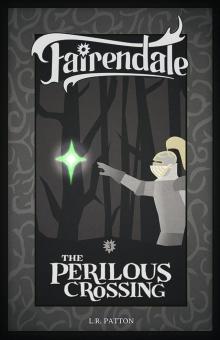 The Perilous Crossing
The Perilous Crossing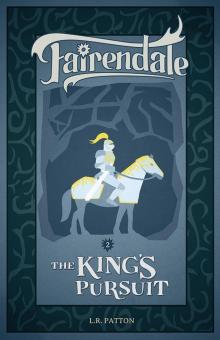 The King's Pursuit
The King's Pursuit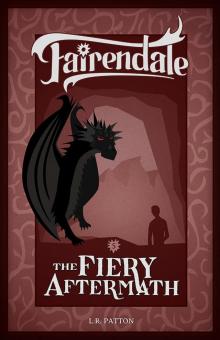 The Fiery Aftermath
The Fiery Aftermath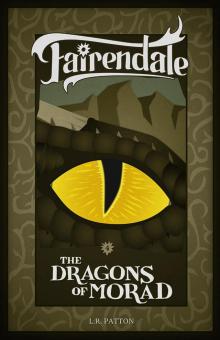 The Dragons of Morad
The Dragons of Morad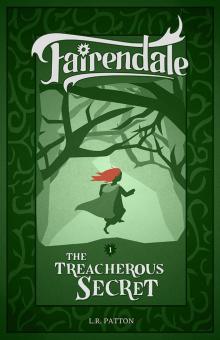 The Treacherous Secret
The Treacherous Secret